A Year for Wildlife: NCWF 2023 Year in Review
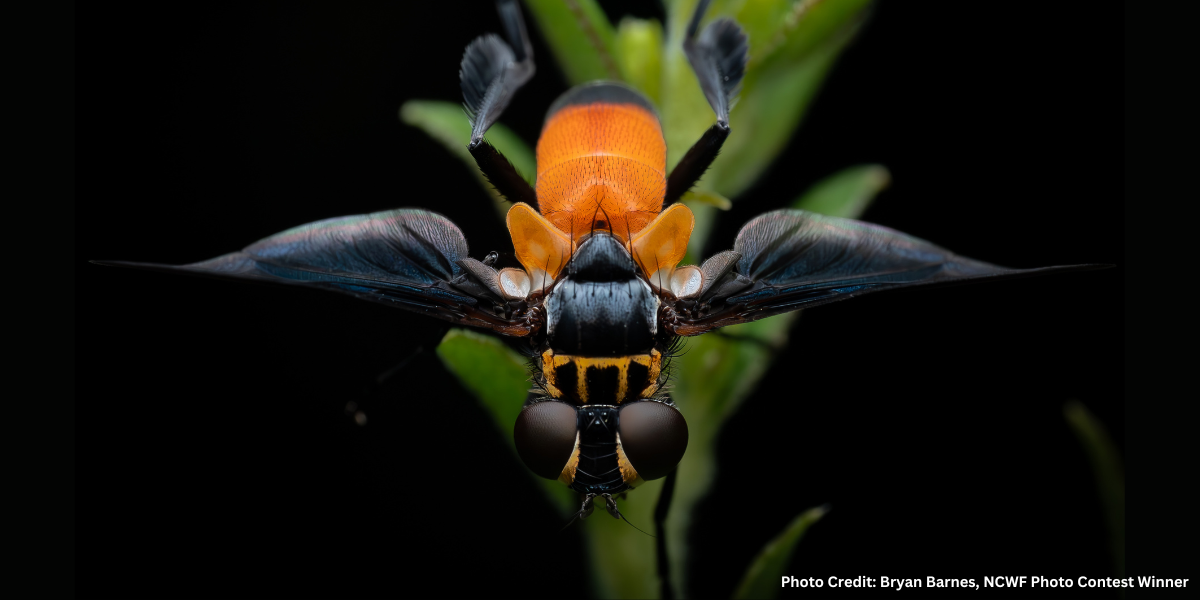
Many thoughts and emotions come to the surface at the end of each year, and they vary from person to person. However, a shared reality unites us all: a year may pass swiftly… but it holds a wealth of experiences and impact.
This holds especially true for NCWF in 2023 and the comprehensive efforts statewide in conserving and restoring wildlife and habitat throughout North Carolina. From dedicated marine resource conservation to restoring monarch habitats, connecting children with nature, honoring conservation heroes, and everything in between — NCWF has had an incredibly active and, thanks to the collaborative conservation community in North Carolina, a highly fruitful year.
Through this Year in Review, we hope you feel a sense of belonging and pride in this community of conservation. Though these accomplishments only scratch the surface of what was accomplished this year, we hope you feel encouraged, empowered, and celebrated as a key element of this critical mission to protect, conserve, and restore wildlife in North Carolina.
 Summary
Summary
- 5,323 trees and plants planted, and 115,785 pounds of trash removed through 114 projects involving 2,462 volunteers
- Three litters of red wolf pups born for the wild population, one in the wild and two in acclimation pens
- $45.2 million allocated to working lands conservation over the next two years through 2024 NC State Budget
- $2 million allocated to NC Department of Transportation for wildlife crossing work in Haywood County
- 53 people newly engaged through educational hunting programs
- NCWF and our Community Wildlife Chapters orchestrated 62 nature outings and 150 educational programs and outreach initiatives
- 7,808 youth connected to nature through outdoor experiences
- 14k+ people are engaged in the conservation community that supports NCWF in numerous ways
Wildlife
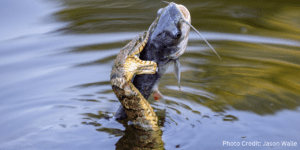
Photo Credit: Jason Walle, NCWF Photo Contest Winner
All of our endeavors, whether involving habitat cleanups, native plantings, educational webinars, nature outings, or policy advocacy, ultimately aim to benefit wildlife. In 2023, we witnessed significant outcomes in support of wildlife across the state.
Conservation Policy: NC State Budget
North Carolina has seen some significant wildlife-centric policy gains this year, particularly as it pertains to conservation allocations in the NC 2024 State Budget!
Preserving Working Lands:
Agriculture and Farmland Preservation Trust Fund earmarked $20.1 million for FY23-24 and $25.1 million for FY24-25, fostering conservation on working lands.
Diverse Habitat Support:
Land and Water Fund allocated $28 million for gamelands, upland, and riverine habitats.
Parks and Recreation Trust Fund secured $28 million for state and local park projects, with an additional $12.5 million designated for parks catering to individuals with disabilities.
Trail Enhancement:
A nonrecurring $12.5 million (totaling $25 million for the biennium) is dedicated to the Great Trails Program.
An additional $5 million in FY23-24 is allocated for advancing the Complete the Trails initiative.
Historic Investment in Wildlife Crossings:
Breaking new ground, the General Assembly allocated $2 million to the North Carolina Department of Transportation for wildlife crossing initiatives in Haywood County.
Strengthening Wildlife Enforcement:
Addressing a lapse since the 1970s, the budget introduces provisions for 16 new wildlife enforcement officer positions, a critical move in enhancing conservation efforts.
Legislation Moving Forward:
Legislative strides include measures for protecting trout waters, promoting the use of native plants in public projects, and a heightened focus on marine resources, water protection, wildlife disease management, and flood mitigation. These priorities are set to take center stage in the upcoming legislative session.
Red Wolf Recovery
The updated Red Wolf Recovery Plan was unveiled in late September 2023, and the USFWS is currently developing the Recovery Implementation Strategy for the species. This year, the wild population gained three litters, one in the wild and two in acclimation pens. Additionally, a male pup was successfully fostered into a wild litter, and two new Red Wolves joined the red wolf center for education in November 2023, with previous members sent as companions for other Red Wolves.
Habitat
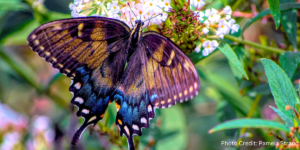
Photo Credit: Pamela Strand, NCWF Photo Contest Winner
NCWF volunteers and staff really hit the ground running last year and got their hands dirty restoring habitat for wildlife. In total, 2,462 volunteers participated in 114 habitat restoration projects that removed 115,785 pounds of litter and planted 5,323 trees and plants (including 3,217 pollinator plants).
This year marked a significant achievement for The Butterfly Highway, reaching a total of 3,000 registered pollinator pitstops over the program’s lifetime!
So far this year, 383 locations along the Butterfly Highway were registered as pollinator pitstops, and an impressive 941 yards were registered as Certified Wildlife Habitats. Notably, Charlotte earned the second-place spot nationally for wildlife-friendly gardening, largely attributed to the impactful initiatives of NCWF’s Butterfly Highway and Certified Wildlife Habitat programs!
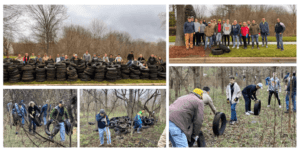
Tire Dump Cleanup, Feb 25 NCWF Wildlife Chapter Marvin Area for the Restoration and Sustainability of Wildlife Habitat (MARSH) brought together over 30 volunteers to remove and recycle a whopping 19,450 pounds worth of tires from the McBride Branch wetlands, an important ecosystem for wildlife.
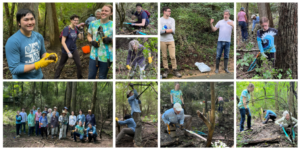
Bolin Creek Invasive Plant Removal, July 16. NCWF’s newest chapter, the Tri-County Conservationists (Alamance, Orange, Chatham), held their inaugural chapter event. The intrepid crew tackled a much needed invasive removal project along Bolin Creek in Chapel Hill. Despite the intimidating privet and wisteria that plagued the habitat, the workday was characterized by a healthy dose of optimism and genuine comradery among the volunteers. The chapter has taken ownership of the site and conducted 4 invasive removals this year at Bolin Creek.
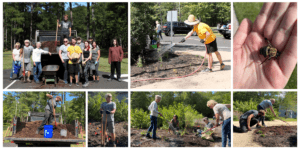
Merchants Millpond State Park Pollinator Planting, October 1. NCWF’s Wildlife Habitat Stewards of NE NC chapter, community volunteers and state park personnel installed native pollinator plants at Merchants Millpond State Park’s visitor center in Gatesville. The chapter’s goals for this habitat project were to plant native species that would serve as crucial food sources and habitat for native pollinators in the area and to also use the garden as an educational tool for years to come at Merchants Millpond!
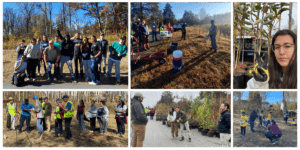
Creek Releaf Charlotte, Nov 18. NCWF partnered with Charlotte Public Tree Fund and Charlotte-Mecklenburg Storm Water Services for Charlotte’s annual Creek ReLeaf tree planting. This year a section of Long Creek Greenway was chosen for planting to improve air quality, water quality, and to increase tree canopy coverage in North Charlotte. Volunteers from Central Piedmont Community College, Charlotte Wildlife Stewards, and a number of Scout troops, among other groups, showed up to plant 325 trees! Native species including black gum, sweet bay magnolia, possumhaw, and swamp white oak were specifically selected to provide forage and habitat for pollinators and many other wildlife species in the area. The Carolina Raptor Center concluded the day with the release of a beautiful red-tailed hawk back into the wild!
People

Photo Credit: Cole Smith, NCWF Photo Contest Winner
A thriving conservation community is most effective when it is rooted in a culture of care and active participation. This underscores the significance we place on connecting people with nature, and the past year marked a significant period of fostering such connections with the natural world and wildlife.
NCWF recognized 18 individuals and groups through the 59th Annual Governor’s Conservation Achievement Awards in September, and awarded six undergraduate, graduate, and PhD students with scholarships to continue their work in the field of conservation.
NCWF and our Community Wildlife Chapters orchestrated 62 outdoor events and 150 educational programs and outreach initiatives. Among these were 27 wildlife education webinars, and our red wolf live camera garnered nearly 1.4 million views. Additionally, NCWF’s Great Outdoors University organized 100 day trips and hosted 6 events, facilitating a total of 5,473 participants in establishing meaningful connections with nature.
The Getting Started Outdoors program successfully engaged 38 participants in various turkey, squirrel, and deer hunting educational programs and the Academics Afield program, in collaboration with the Wake County Wildlife Club, introduced 15 people to ethical, conservation-based hunting through events such as clay shooting, archery days, and tree stand safety instructions.
The Red Wolf Center experienced a surge in activity this year, with a new mural adorning the building and a photo exhibit installation, both generating considerable traction and outreach. The Center hosted 659 visitors across 313 readily available public programs. The Red Wolf Center has almost exceeded previous visitation records in the history of its time as an education facility and may cross that threshold by the end of the year. Visitation to the center has already exceeded the record since NCWF first took over the facility in 2018.The total Red Wolf Programs offered to the public this year (both those held at the red wolf center and additional programs) has exceeded a reach of 1200 people.
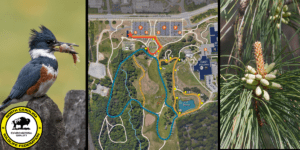
In partnership with North Carolina Wildlife Federation (NCWF), the North Carolina Museum of Art (NCMA) celebrated the opening of the brand new All Access Eco Trail in NCMA’s Ann and Jim Goodnight Museum Park, just outside the doors of the museum’s main building. The All-Access Eco Trail is a series of braille and tactile signs, as well as full audio descriptions, designed to educate both visually impaired and sighted audiences. The signage and audio lead participants along a pathway through different habitats with diverse wildlife. Depending on the route taken, the trail ranges between 0.25 and 0.75 miles.
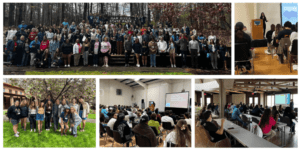
Students from universities all across the state gathered at Haw River State Park for an inspiring weekend fueled by critically-important environmental activism focused on issues such as fisheries, plastics, and offshore wind energy. The Ocean Advocacy Workshop is designed to teach participants the skills they need to champion oceans and the environment. The event was sponsored by the North Carolina Wildlife Federation, UNC Greensboro, and the Plastics Ocean Project.
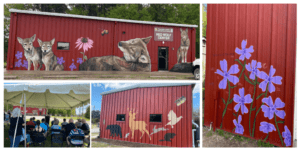
Matt Willey, artist and founder of The Good of the Hive, teamed up with Weiler Woods for Wildlife, the U.S. Fish and Wildlife Service – Red Wolf Recovery Program and Pocosin Lakes National Wildlife Refuge, NCWF, and other community partners to create a one-of-a-kind mural at the Red Wolf Center in Columbia, NC. In addition to red wolves, the mural features native plants and pollinators such as purple coneflowers and leafcutter bees.
Infrastructure
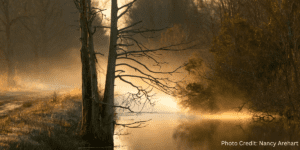
Photo Credit: Nancy Arehart, NCWF Photo Contest Winner
Though much of NCWF’s work is clear to see through habitat projects and public-facing advocacy, there have been some major developments behind the scenes.
NCWF underwent a thorough planning process to ensure our efforts are honed and executed to realize critical conservation priorities. Our Living Conservation Impact Plan builds upon four board-approved organizational goals: Wildlife, Habitat, People, and Infrastructure. We realize that wildlife and habitat are inextricably tied together, and that people make it happen as the voices for those places and species who cannot speak. Defining, communicating, and aligning these priorities among NCWF staff, board, and constituents will ultimately determine success and impact.
The NCWF staff also welcomed two new members to the team! Natalie Bohorquez joined on as the new Director of Conservation Partnerships, overseeing NCWF’s statewide Community Wildlife Chapter network.
“I was born in Bogota, Colombia, and I moved to the United States when I was nine years old. I’ve been in North Carolina for half my life now, and I studied biological engineering at NC State University. I’ve been volunteering with the Charlotte Wildlife Stewards for a little over a year. The first event in which I volunteered was the annual Wild on the Water fundraiser, and ever since then I’ve been hooked. Prior to my time at NCWF, I was a practicing water resources engineer focused primarily on water quality improvements and flood mitigation, so despite not working directly in the conservation world, my intent was always to leave a place better than how I found it for the welfare of the critters and people downstream. My favorite animal, the Green Sea Turtle, hatches along the coast of North Carolina but is a citizen of the world. My favorite plant is the Post Oak; there is nothing better than shading under a sturdy tree on a hot summer day.”
Another recent addition to the NCWF team, Alden Picard joined on as the newest Conservation Coordinator.
“I was raised in Raleigh, NC. Prior to working for the Federation, I served as a lead volunteer with the Charlotte Wildlife Stewards for three years which included participation in critical stream restoration projects at Chantilly Ecological Sanctuary near uptown Charlotte. While in graduate school at UNCW, I studied Coastal Resource Management and participated directly in the conservation of longleaf pine ecosystems through prescribed burns and photo point monitoring of habitats at Carolina Beach State Park. Quite naturally my favorite native plant is the longleaf pine and my favorite native animal is the fox squirrel. Although these could certainly change on any given day!”

Natalie Bohorquez and Alden Picard


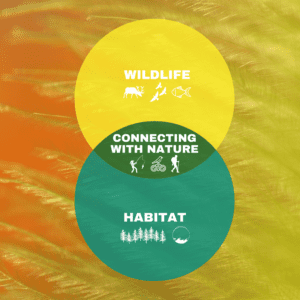 Summary
Summary